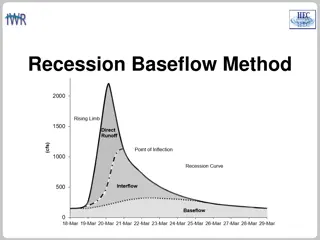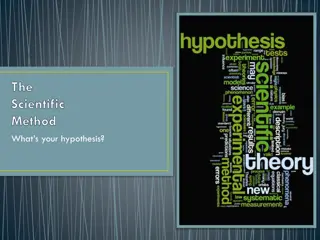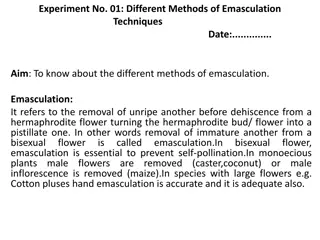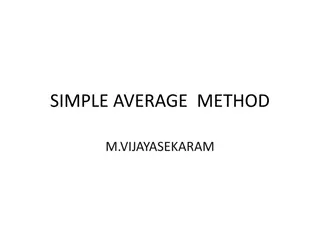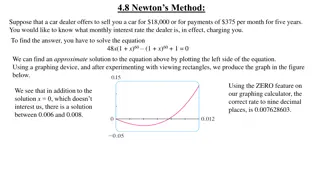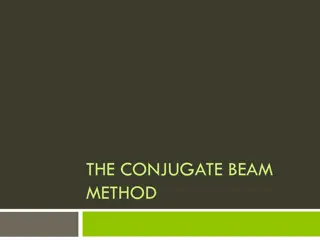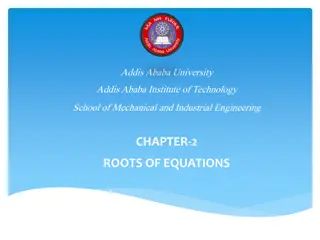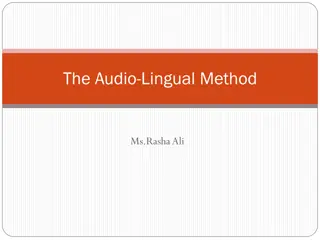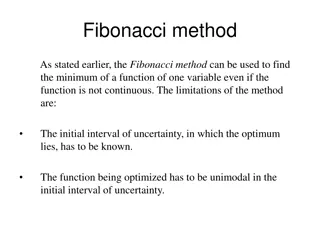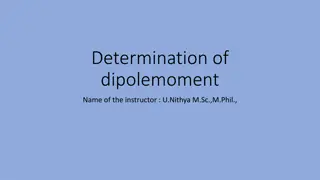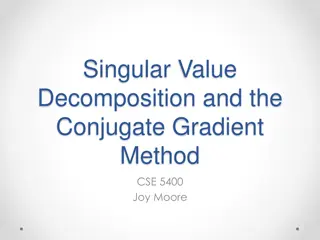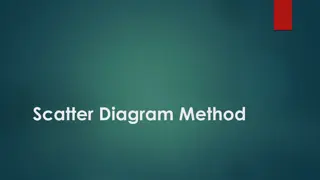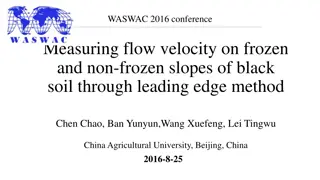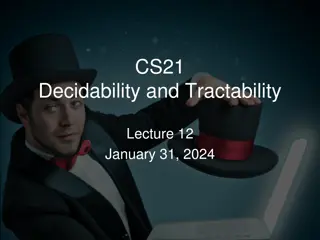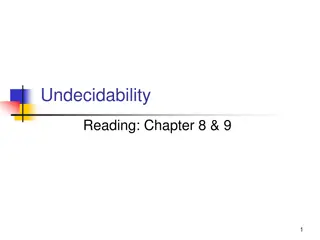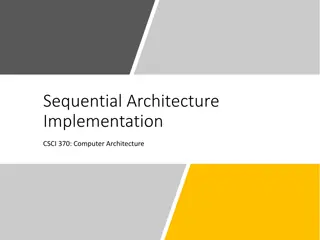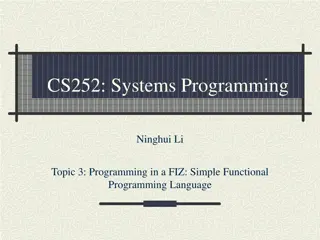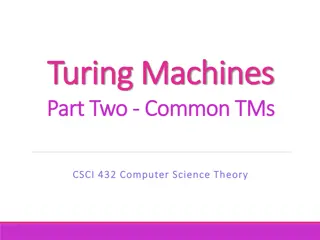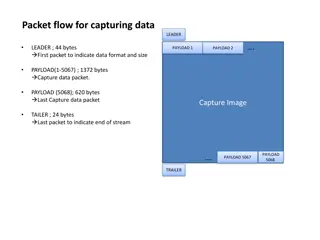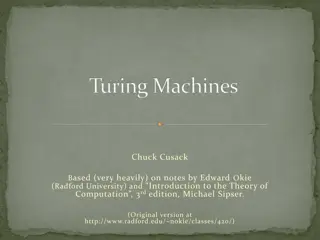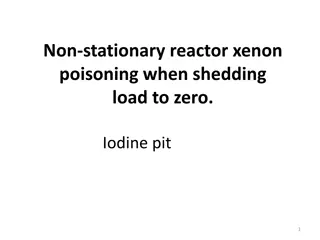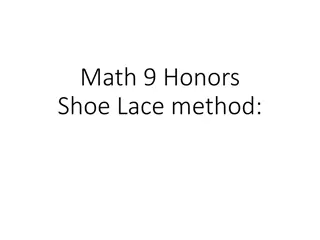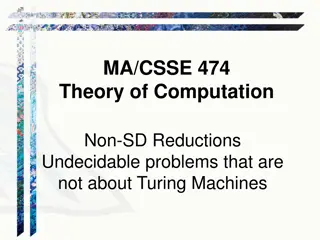Language Teaching Techniques: GTM, Direct Method & Audio-Lingual Method
Explore the Grammar-Translation Method, Direct Method, and Audio-Lingual Method in language teaching. Understand principles, objectives, and methodologies with insights into language learning approaches. Enhance teaching skills and foster effective communication in language education.
3 views • 82 slides
Stress Eating and Resources for PATHWEIGH May 5
Dr. Liz Chamberlain discusses stress eating strategies, focusing on why people eat when stressed, mindfulness techniques to handle food cravings, identifying habits and rewards related to eating, and practicing the HALT method to manage cravings effectively. She emphasizes curiosity, mindfulness, an
1 views • 12 slides
Understanding the Recession Baseflow Method in Hydrology
Recession Baseflow Method is a technique used in hydrology to model hydrographs' recession curve. This method involves parameters like Initial Discharge, Recession Constant, and Threshold for baseflow. By analyzing different recession constants and threshold types such as Ratio to Peak, one can effe
0 views • 8 slides
Understanding the Scientific Method: A Logical Framework for Problem-Solving
The Scientific Method is a systematic approach used to solve problems and seek answers in a logical step-by-step manner. By following key steps such as stating the problem, researching, forming a hypothesis, testing, analyzing data, and drawing conclusions, this method helps clarify uncertainties an
1 views • 18 slides
Introduction to Six Thinking Hats Method for Effective Group Decision Making
Explore the Six Thinking Hats method, a powerful tool for facilitating group discussions and decision-making processes. This method encourages participants to approach problems from various perspectives represented by different colored 'hats'. By simplifying thinking and fostering constructive dialo
1 views • 24 slides
Understanding Corn Growth Stages: Leaf Staging Methods and Considerations
Various leaf staging methods, including the Leaf Collar Method and Droopy Leaf Method, are used to identify corn plant growth stages. The Leaf Collar Method involves counting leaves with visible collars, while the Droopy Leaf Method considers leaves at least 40-50% exposed from the whorl. Factors li
0 views • 9 slides
Understanding Different Emasculation Techniques in Plant Breeding
Learn about the significance of emasculation in plant breeding to prevent self-pollination and facilitate controlled pollination. Explore various methods such as hand emasculation, forced open method, clipping method, emasculation with hot/cold water, alcohol, suction method, chemical emasculation,
2 views • 10 slides
Simple Average Method in Cost Accounting
Simple Average Method, introduced by M. Vijayasekaram, is a technique used for inventory valuation and delivery cost calculation. It involves calculating the average unit cost by multiplying the total unit costs with the number of receiving instances. This method simplifies calculations and reduces
2 views • 5 slides
Understanding Newton's Method for Solving Equations
Newton's Method, also known as the Newton-Raphson method, is a powerful tool for approximating roots of equations. By iteratively improving initial guesses using tangent lines, this method converges towards accurate solutions. This method plays a crucial role in modern calculators and computers for
0 views • 12 slides
Understanding the Conjugate Beam Method in Structural Analysis
The Conjugate Beam Method is a powerful technique in structural engineering, derived from moment-area theorems and statical procedures. By applying an equivalent load magnitude to the beam, the method allows for the analysis of deflections and rotations in a more straightforward manner. This article
1 views • 11 slides
Understanding Roots of Equations in Engineering: Methods and Techniques
Roots of equations are values of x where f(x) = 0. This chapter explores various techniques to find roots, such as graphical methods, bisection method, false position method, fixed-point iteration, Newton-Raphson method, and secant method. Graphical techniques provide rough estimates, while numerica
0 views • 13 slides
Binary Basic Block Similarity Metric Method in Cross-Instruction Set Architecture
The similarity metric method for binary basic blocks is crucial in various applications like malware classification, vulnerability detection, and authorship analysis. This method involves two steps: sub-ldr operations and similarity score calculation. Different methods, both manual and automatic, ha
0 views • 20 slides
Exploring the Audio-Lingual Method in Language Teaching
The Audio-Lingual Method is an oral-based approach that focuses on drilling students in grammatical sentence patterns through behavioral psychology principles. This method, also known as the Michigan Method, emphasizes habit formation and uses techniques like dialogues, repetition drills, and role-p
1 views • 16 slides
Understanding the Kinetics of Fast Reactions in Chemistry
Kinetic methods involve measuring analytical signals under dynamic conditions to study fast reactions in chemistry. This study explores the various methods used, such as Flow Method and Stopped Flow Method, to determine reaction rates accurately. Advantages of the Stopped Flow Method over Continuous
0 views • 18 slides
Understanding The Halt Service: A Social Work Perspective
The Halt Service focuses on working with children and young people aged 5-18 who have displayed Harmful Sexual Behaviour. They offer bespoke assessments tailored to each individual's needs, emphasizing joint work with various sectors and consultations to provide effective interventions. The service
0 views • 7 slides
Understanding the Fibonacci Method for Function Optimization
The Fibonacci method offers a systematic approach to finding the minimum of a function even if it's not continuous. By utilizing a sequence of Fibonacci numbers, this method helps in narrowing down the interval of uncertainty to determine the optimal solution through a series of experiments. Despite
1 views • 19 slides
Determination of Chloride by Mohr Method
Precipitation titration is a volumetric method used for determining chloride ions. Mohr's method involves reacting alkaline or alkaline earth chlorides with silver nitrate in the presence of a potassium chromate indicator. The endpoint of the titration is signaled by the appearance of red silver chr
0 views • 9 slides
Determination of Dipole Moment in Chemistry
The determination of dipole moment in chemistry involves methods such as the Temperature Method (Vapour Density Method) and Refractivity Method. These methods rely on measuring various parameters like dielectric constants and polarizations at different temperatures to calculate the dipole moment of
1 views • 15 slides
Accounting Entries in Hire Purchase System for Credit Purchase with Interest Method
In the Credit Purchase with Interest Method of Hire Purchase System, assets acquired on hire purchase basis are treated as acquired on outright credit basis with interest. This method involves initial entries for recording the asset acquisition, down payments, interest on outstanding balance, instal
0 views • 10 slides
Understanding Singular Value Decomposition and the Conjugate Gradient Method
Singular Value Decomposition (SVD) is a powerful method that decomposes a matrix into orthogonal matrices and diagonal matrices. It helps in understanding the range, rank, nullity, and goal of matrix transformations. The method involves decomposing a matrix into basis vectors that span its range, id
0 views • 21 slides
Understanding Scatter Diagram Method for Correlation Analysis
Scatter Diagram Method is a simple and effective way to study the correlation between two variables. By plotting data points on a graph, it helps determine the degree of correlation between the variables. Perfect positive and negative correlations, as well as high and low degrees of correlation, can
0 views • 11 slides
Measurement of Flow Velocity on Frozen and Non-Frozen Slopes of Black Soil Using Leading Edge Method
This study presented a detailed methodology for measuring flow velocity on frozen and non-frozen slopes of black soil, focusing on the Leading Edge method. The significance of shallow water flow velocity in soil erosion processes was emphasized. Various methods for measuring flow velocity were compa
0 views • 23 slides
Understanding the Halting Problem and Uncomputable Programs
The Halting Problem in computer science presents a practical uncomputable problem where determining whether a program will halt or run forever is impossible. This concept is explored through a proof by contradiction and a tricky program called Diagonal.java. The program showcases the challenges of p
2 views • 23 slides
Cell Cycle Checkpoints and Meiosis Overview
Cell cycle regulation involves checkpoints at key stages like G1/S, G2/M, and M to ensure proper progression or halt if needed. Cancer cells disrupt this control, leading to uncontrolled proliferation. Meiosis involves two successive divisions, resulting in the reduction of chromosome number and gen
0 views • 27 slides
Fascinating Facts About Foxes
Foxes are omnivorous mammals from the Canidae family, commonly known as wild dogs. They come in 12 different species, with unique features like bushy tails and pointed ears. Male foxes are called reynards, females vixens, and babies pups or cubs. These animals have a diverse diet and can be found in
1 views • 8 slides
Challenges in HIV Transmission Control: Lessons from Indiana Outbreak
Addressing the persistent challenges of HIV transmission control in injection drug use, Dr. Diane M. Janowicz's presentation delves into the HIV outbreak in rural Indiana, interventions to halt the spread, and key elements for HIV treatment amidst the crisis.
0 views • 20 slides
Exploring the Challenges of Leaving Volunteering Due to Age-Related Issues
The study delves into the personal experiences of individuals who have had to halt their volunteer work due to age-related concerns. It examines the impact on wellbeing, the management challenges faced, and the emotional journey of volunteers and managers in such situations. Through interviews and d
0 views • 15 slides
Understanding the Halting Problem in CS Theory
Delve into the intricacies of the Halting Problem and its undecidability in computer science theory. Learn about the concepts of decidable and undecidable languages, the implications of the Halting Problem on computing, and explore the proof that demonstrates the undecidability of HALT.
0 views • 24 slides
Understanding Recursive and Recursively Enumerable Languages
Exploring the concepts of decidability and undecidability in computer science, specifically focusing on Recursive and Recursively Enumerable (RE) languages. Recursive languages always halt, while RE languages may or may not halt, showcasing the differences between decidable and undecidable problems.
0 views • 35 slides
Understanding Y86-64 Instruction Set and Hardware Control Language
Delve into the Y86-64 instruction set architecture, exploring sequential architecture implementations for computer architecture. Uncover the various instruction sets and their functionalities, such as halt, nop, call, ret, and more. Additionally, discover the building blocks of hardware, including A
0 views • 51 slides
Understanding FIZ: A Simple Functional Programming Language
FIZ is a functional programming language that uses only integers and supports basic features like incrementing, decrementing, and conditional expressions. Functions are defined in a simple manner, and errors can be handled using the "halt" command. The language emphasizes recursion over loops and fe
0 views • 21 slides
Understanding Turing Machines and Busy Beaver Problem in Computer Science Theory
Delve into the realm of Turing machines, the Busy Beaver problem, palindromes, and incrementing algorithms. Explore the configurations of a Turing machine tape, the maximum number of 1s a machine can print and still halt, algorithms to determine palindromes, and tape setup for incrementing.
0 views • 10 slides
Wireshark Data Capture and UDP Analysis
Capturing data flow through packets in Wireshark reveals a series of fragmented payloads, starting with a leader packet of 44 bytes and ending with a trailer of 24 bytes. The UDP data payloads range from 44 to 1372 bytes, with specific lengths for different payloads and packets. Analysis includes UD
0 views • 4 slides
The Duel for North America: France's Colonization Efforts
France, like England and Holland, was a latecomer in the race for North American colonies. King Louis XIV took an interest in overseas territories, leading to the establishment of Quebec in 1608. Samuel de Champlain played a key role in French colonization efforts, forging alliances with Native Amer
0 views • 20 slides
Understanding the Stanford Prison Experiment
Explore the infamous Stanford Prison Experiment conducted by Phil Zimbardo, where college students were assigned roles of prisoners and guards in a simulated prison environment. Witness the rapid deterioration of behaviors and mental states, leading to the premature halt of the study. Delve into the
0 views • 16 slides
Overview of Turing Machines: Introduction, Tape, and Computation
Turing Machines are fundamental in the theory of computation, capable of recognizing all computable languages. They consist of a Finite State Machine combined with an infinite tape. The tape is initialized with input on the left end, and a TM's computation can either halt by entering special accept
0 views • 29 slides
Reactor Xenon Poisoning and Iodine Pit Phenomenon
When a non-stationary reactor is shut down or its load is reduced to zero, xenon poisoning occurs due to the disruption of dynamic equilibrium between the increase and decrease of 135Xe. This leads to a temporary increase in 135Xe concentration, followed by a decrease as it decays. The reactivity ma
0 views • 58 slides
Understanding the Shoe Lace Method for Finding Polygon Areas
The Shoe Lace Method is a mathematical process used to determine the area of any polygon by employing coordinate geometry. By following specific steps, including organizing coordinates, multiplying diagonally, and adding columns in a certain manner, the method allows for a straightforward calculatio
0 views • 8 slides
CWE Flow-Based Intraday Developments - Current Status and Future Outlook
CWE has been working on implementing Flow-Based Intraday Capacity Calculation (FB.IDCC) initiatives since 2014, focusing on improving ID ATC processes and methodologies. Despite challenges with CGMES standards implementation causing delays, CWE TSOs and NRAs have agreed to temporarily halt FB.IDCC a
0 views • 4 slides
Undecidable Problems in Theory of Computation
Explore the concept of undecidable problems in the theory of computation, focusing on non-SD reductions and undecidable problems not involving Turing Machines. Learn about proving languages are not SD, using examples like AanBn and creating reductions to show non-SD properties. Work through reductio
0 views • 31 slides


